1
2
3
4
5
6
7
8
9
10
11
12
13
14
15
16
17
18
19
20
21
22
23
24
25
26
27
28
29
30
31
32
33
34
35
36
37
38
39
40
41
42
43
44
45
46
47
48
49
50
51
52
53
54
55
56
57
58
59
60
61
62
63
64
65
66
67
68
69
70
71
72
73
74
75
76
77
78
79
80
81
82
83
84
85
86
87
88
89
90
91
92
93
94
95
96
97
98
99
100
101
102
103
104
105
106
107
108
109
110
111
112
113
114
115
116
117
118
119
120
121
122
123
124
125
126
127
128
129
130
131
132
133
134
135
136
137
138
139
140
141
142
143
144
145
146
147
148
149
150
151
152
153
154
155
156
157
158
159
160
161
162
163
164
165
166
167
168
169
170
171
172
173
174
175
176
177
178
179
180
181
182
183
184
185
186
187
188
189
190
191
192
193
194
195
196
197
198
199
200
201
202
203
204
205
206
207
208
209
210
211
212
213
214
215
216
217
218
219
220
221
222
223
224
225
226
227
228
229
230
231
232
233
|
---
stage: Software Supply Chain Security
group: Authentication
info: To determine the technical writer assigned to the Stage/Group associated with this page, see https://handbook.gitlab.com/handbook/product/ux/technical-writing/#assignments
---
# Example group SAML and SCIM configurations
DETAILS:
**Tier:** Premium, Ultimate
**Offering:** GitLab.com
These are notes and screenshots regarding Group SAML and SCIM that the GitLab Support Team sometimes uses while troubleshooting, but which do not fit into the official documentation. GitLab is making this public, so that anyone can make use of the Support team's collected knowledge.
Refer to the GitLab [Group SAML](index.md) documentation for information on the feature and how to set it up.
When troubleshooting a SAML configuration, GitLab team members will frequently start with the [SAML troubleshooting section](index.md#troubleshooting).
They may then set up a test configuration of the desired identity provider. We include example screenshots in this section.
## SAML and SCIM screenshots
This section includes relevant screenshots of the following example configurations of [Group SAML](index.md) and [Group SCIM](scim_setup.md):
- [Azure Active Directory](#azure-active-directory)
- [Google Workspace](#google-workspace)
- [Okta](#okta)
- [OneLogin](#onelogin)
WARNING:
These screenshots are updated only as needed by GitLab Support. They are **not** official documentation.
If you are currently having an issue with GitLab, you may want to check your [support options](https://about.gitlab.com/support/).
## Azure Active Directory
This section has screenshots for the elements of Azure Active Directory configuration.
### Basic SAML app configuration

### User claims and attributes
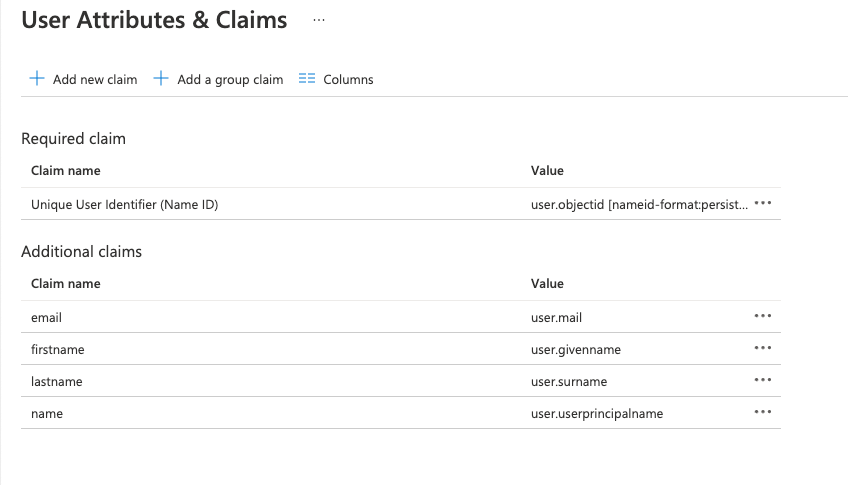
### SCIM mapping
Provisioning:

### Attribute mapping
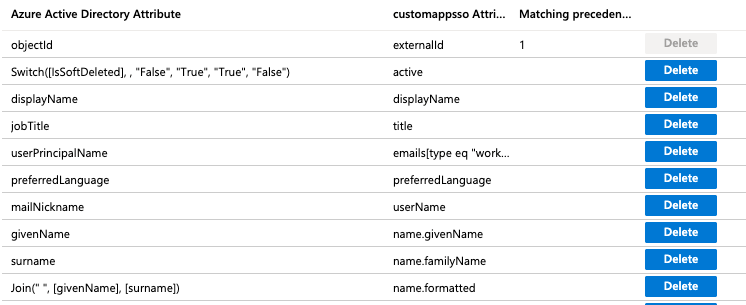
### Group Sync

Using the **Group ID** source attribute requires users to enter the group ID or object ID when configuring SAML group links.
If available, you can add user-friendly group names instead. When setting up Azure group claims:
1. Select the **sAMAccountName** source attribute.
1. Enter a group name. You can specify a name up to 256 characters long.
1. To ensure the attribute is part of the assertion, select **Emit group names for cloud-only groups**.
[Azure AD limits the number of groups that can be sent in a SAML response to 150](https://support.esri.com/en-us/knowledge-base/when-azure-ad-is-the-saml-identify-provider-the-group-a-000022190). If a user is a member of more than 150 groups, Azure does not include that user's group claim in the SAML response.
## Google Workspace
### Basic SAML app configuration
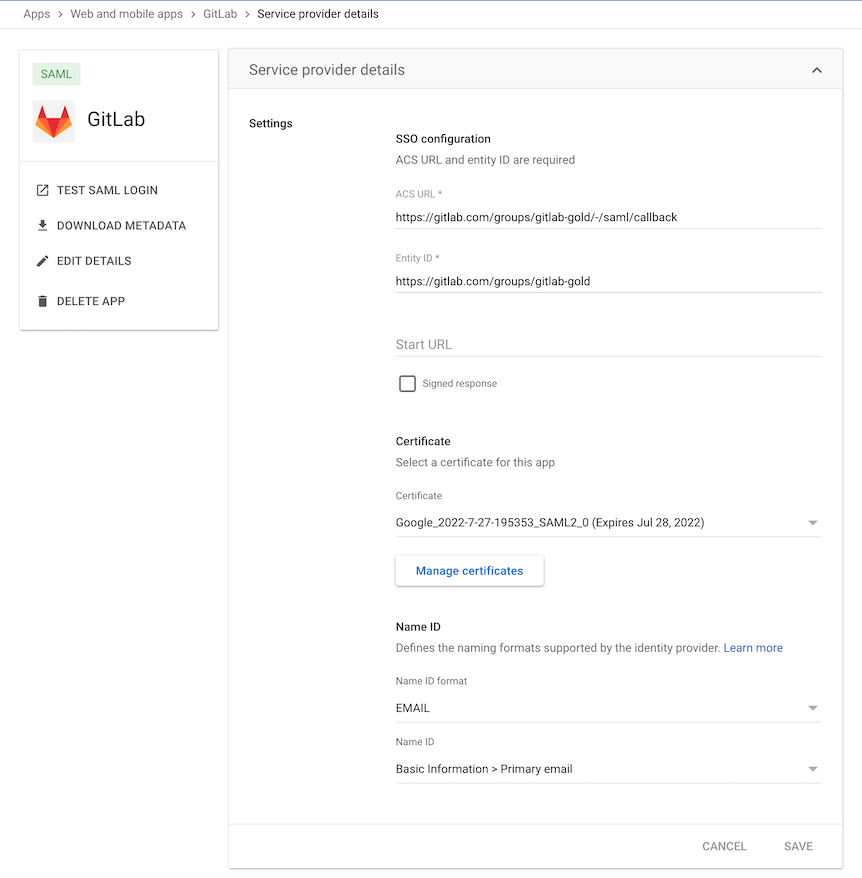
### User claims and attributes
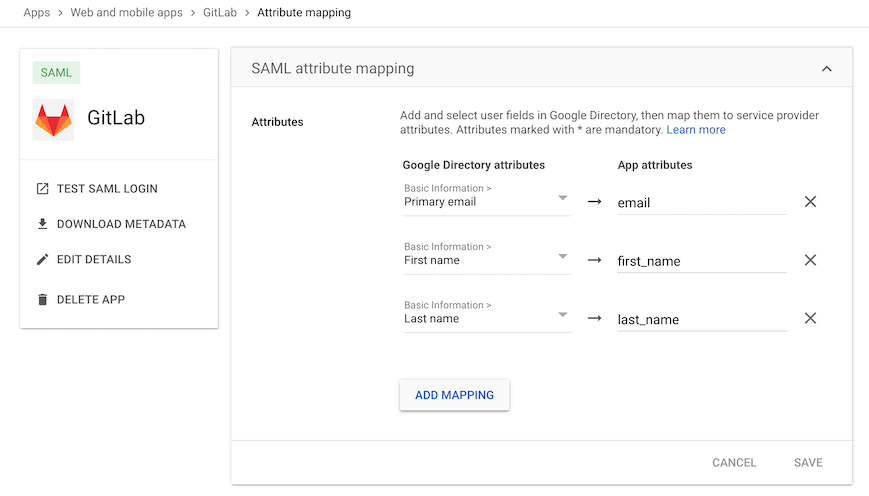
### IdP links and certificate
NOTE:
Google Workspace displays a SHA256 fingerprint. To retrieve the SHA1 fingerprint required by GitLab for configuring SAML, download the certificate and calculate the SHA1 certificate
fingerprint.

## Okta
### Basic SAML app configuration for GitLab.com groups

### Basic SAML app configuration for GitLab self-managed
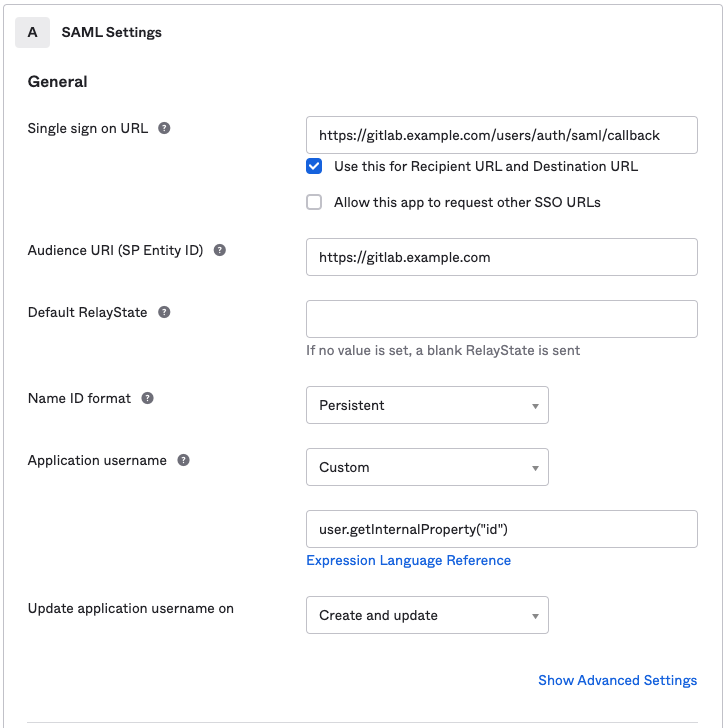
### User claims and attributes
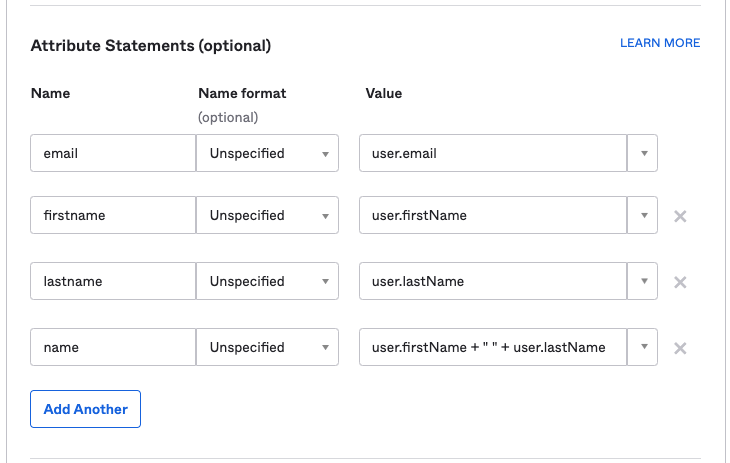
### Group Sync
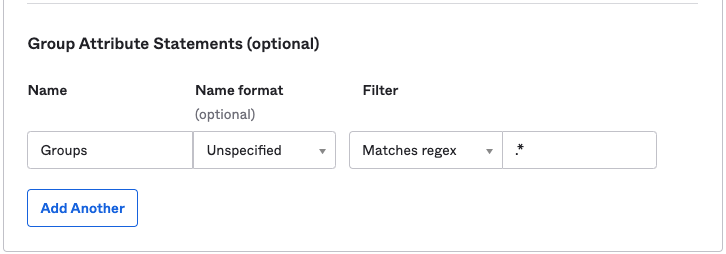
### Advanced SAML app settings (defaults)
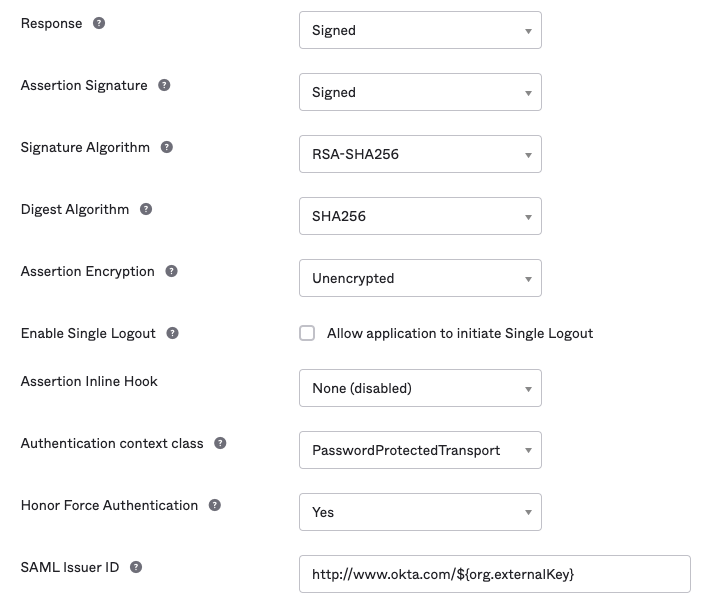
### IdP links and certificate

### SAML sign on settings

### SCIM settings
Setting the username for the newly provisioned users when assigning them the SCIM app:

## OneLogin
### Basic SAML app configuration

### Parameters

### Adding a user

### SSO settings
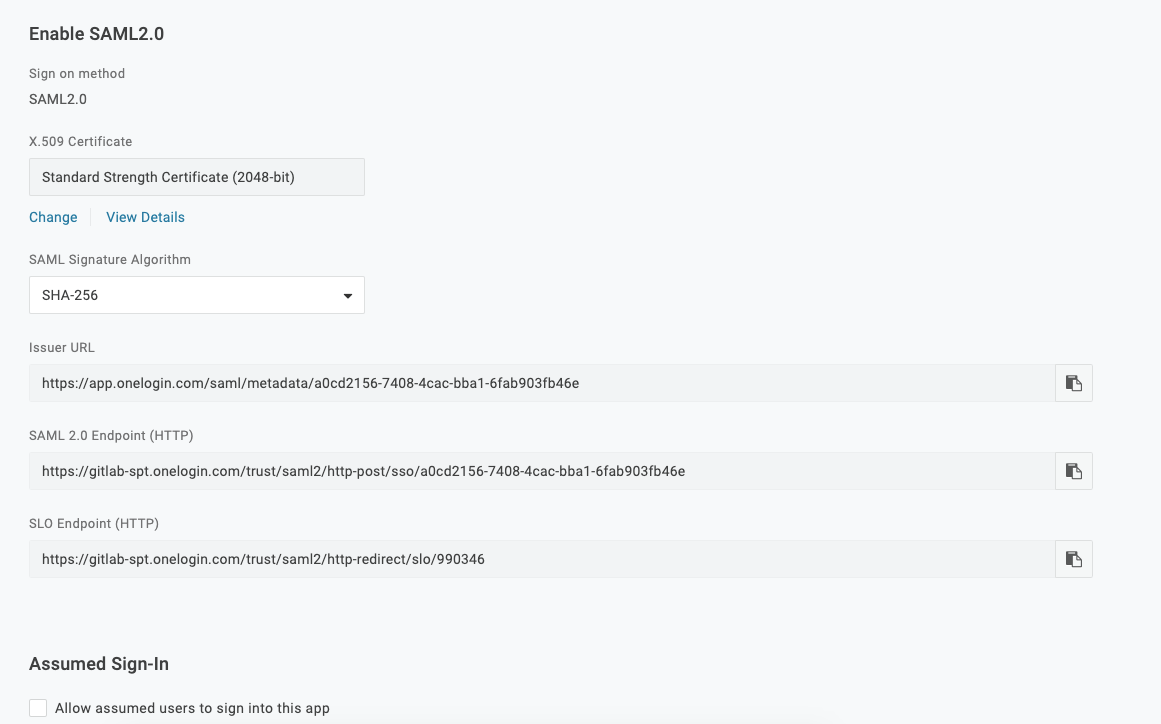
## SAML response example
When a user signs in using SAML, GitLab receives a SAML response. The SAML response can be found in `production.log` logs as a base64-encoded message. Locate the response by
searching for `SAMLResponse`. The decoded SAML response is in XML format. For example:
```xml
<?xml version="1.0" encoding="UTF-8"?>
<saml2p:Response xmlns:saml2p="urn:oasis:names:tc:SAML:2.0:protocol" xmlns:xs="http://www.w3.org/2001/XMLSchema" Destination="https://gitlabexample/-/saml/callback" ID="id4898983630840142426821432" InResponseTo="_c65e4c88-9425-4472-b42c-37f4186ac0ee" IssueInstant="2022-05-30T21:30:35.696Z" Version="2.0">
<saml2:Issuer xmlns:saml2="urn:oasis:names:tc:SAML:2.0:assertion" Format="urn:oasis:names:tc:SAML:2.0:nameid-format:entity">http://www.okta.com/exk2y6j57o1Pdr2lI8qh7</saml2:Issuer>
<ds:Signature xmlns:ds="http://www.w3.org/2000/09/xmldsig#">
<ds:SignedInfo>
<ds:CanonicalizationMethod Algorithm="http://www.w3.org/2001/10/xml-exc-c14n#"/>
<ds:SignatureMethod Algorithm="http://www.w3.org/2001/04/xmldsig-more#rsa-sha256"/>
<ds:Reference URI="#id4898983630840142426821432">
<ds:Transforms>
<ds:Transform Algorithm="http://www.w3.org/2000/09/xmldsig#enveloped-signature"/>
<ds:Transform Algorithm="http://www.w3.org/2001/10/xml-exc-c14n#">
<ec:InclusiveNamespaces xmlns:ec="http://www.w3.org/2001/10/xml-exc-c14n#" PrefixList="xs"/>
</ds:Transform>
</ds:Transforms>
<ds:DigestMethod Algorithm="http://www.w3.org/2001/04/xmlenc#sha256"/>
<ds:DigestValue>neiQvv9d3OgS4GZW8Nptp4JhjpKs3GCefibn+vmRgk4=</ds:DigestValue>
</ds:Reference>
</ds:SignedInfo>
<ds:SignatureValue>dMsQX8ivi...HMuKGhyLRvabGU6CuPrf7==</ds:SignatureValue>
<ds:KeyInfo>
<ds:X509Data>
<ds:X509Certificate>MIIDq...cptGr3vN9TQ==</ds:X509Certificate>
</ds:X509Data>
</ds:KeyInfo>
</ds:Signature>
<saml2p:Status xmlns:saml2p="urn:oasis:names:tc:SAML:2.0:protocol">
<saml2p:StatusCode Value="urn:oasis:names:tc:SAML:2.0:status:Success"/>
</saml2p:Status>
<saml2:Assertion xmlns:saml2="urn:oasis:names:tc:SAML:2.0:assertion" xmlns:xs="http://www.w3.org/2001/XMLSchema" ID="id489" IssueInstant="2022-05-30T21:30:35.696Z" Version="2.0">
<saml2:Issuer xmlns:saml2="urn:oasis:names:tc:SAML:2.0:assertion" Format="urn:oasis:names:tc:SAML:2.0:nameid-format:entity">http://www.okta.com/exk2y6j57o1Pdr2lI8qh7</saml2:Issuer>
<ds:Signature xmlns:ds="http://www.w3.org/2000/09/xmldsig#">
<ds:SignedInfo>
<ds:CanonicalizationMethod Algorithm="http://www.w3.org/2001/10/xml-exc-c14n#"/>
<ds:SignatureMethod Algorithm="http://www.w3.org/2001/04/xmldsig-more#rsa-sha256"/>
<ds:Reference URI="#id48989836309833801859473359">
<ds:Transforms>
<ds:Transform Algorithm="http://www.w3.org/2000/09/xmldsig#enveloped-signature"/>
<ds:Transform Algorithm="http://www.w3.org/2001/10/xml-exc-c14n#">
<ec:InclusiveNamespaces xmlns:ec="http://www.w3.org/2001/10/xml-exc-c14n#" PrefixList="xs"/>
</ds:Transform>
</ds:Transforms>
<ds:DigestMethod Algorithm="http://www.w3.org/2001/04/xmlenc#sha256"/>
<ds:DigestValue>MaIsoi8hbT9gsi/mNZsz449mUuAcuEWY0q3bc4asOQs=</ds:DigestValue>
</ds:Reference>
</ds:SignedInfo>
<ds:SignatureValue>dMsQX8ivi...HMuKGhyLRvabGU6CuPrf7==<</ds:SignatureValue>
<ds:KeyInfo>
<ds:X509Data>
<ds:X509Certificate>MIIDq...cptGr3vN9TQ==</ds:X509Certificate>
</ds:X509Data>
</ds:KeyInfo>
</ds:Signature>
<saml2:Subject xmlns:saml2="urn:oasis:names:tc:SAML:2.0:assertion">
<saml2:NameID Format="urn:oasis:names:tc:SAML:2.0:nameid-format:persistent">useremail@domain.com</saml2:NameID>
<saml2:SubjectConfirmation Method="urn:oasis:names:tc:SAML:2.0:cm:bearer">
<saml2:SubjectConfirmationData InResponseTo="_c65e4c88-9425-4472-b42c-37f4186ac0ee" NotOnOrAfter="2022-05-30T21:35:35.696Z" Recipient="https://gitlab.example.com/-/saml/callback"/>
</saml2:SubjectConfirmation>
</saml2:Subject>
<saml2:Conditions xmlns:saml2="urn:oasis:names:tc:SAML:2.0:assertion" NotBefore="2022-05-30T21:25:35.696Z" NotOnOrAfter="2022-05-30T21:35:35.696Z">
<saml2:AudienceRestriction>
<saml2:Audience>https://gitlab.example.com/</saml2:Audience>
</saml2:AudienceRestriction>
</saml2:Conditions>
<saml2:AuthnStatement xmlns:saml2="urn:oasis:names:tc:SAML:2.0:assertion" AuthnInstant="2022-05-30T21:30:35.696Z" SessionIndex="_c65e4c88-9425-4472-b42c-37f4186ac0ee">
<saml2:AuthnContext>
<saml2:AuthnContextClassRef>urn:oasis:names:tc:SAML:2.0:ac:classes:PasswordProtectedTransport</saml2:AuthnContextClassRef>
</saml2:AuthnContext>
</saml2:AuthnStatement>
<saml2:AttributeStatement xmlns:saml2="urn:oasis:names:tc:SAML:2.0:assertion">
<saml2:Attribute Name="email" NameFormat="urn:oasis:names:tc:SAML:2.0:attrname-format:unspecified">
<saml2:AttributeValue xmlns:xs="http://www.w3.org/2001/XMLSchema" xmlns:xsi="http://www.w3.org/2001/XMLSchema-instance" xsi:type="xs:string">useremail@domain.com</saml2:AttributeValue>
</saml2:Attribute>
<saml2:Attribute Name="firtname" NameFormat="urn:oasis:names:tc:SAML:2.0:attrname-format:unspecified">
<saml2:AttributeValue xmlns:xs="http://www.w3.org/2001/XMLSchema" xmlns:xsi="http://www.w3.org/2001/XMLSchema-instance" xsi:type="xs:string">John</saml2:AttributeValue>
</saml2:Attribute>
<saml2:Attribute Name="lastname" NameFormat="urn:oasis:names:tc:SAML:2.0:attrname-format:unspecified">
<saml2:AttributeValue xmlns:xs="http://www.w3.org/2001/XMLSchema" xmlns:xsi="http://www.w3.org/2001/XMLSchema-instance" xsi:type="xs:string">Doe</saml2:AttributeValue>
</saml2:Attribute>
<saml2:Attribute Name="Groups" NameFormat="urn:oasis:names:tc:SAML:2.0:attrname-format:unspecified">
<saml2:AttributeValue xmlns:xs="http://www.w3.org/2001/XMLSchema" xmlns:xsi="http://www.w3.org/2001/XMLSchema-instance" xsi:type="xs:string">Super-awesome-group</saml2:AttributeValue>
</saml2:Attribute>
</saml2:AttributeStatement>
</saml2:Assertion>
</saml2p:Response>
```
|